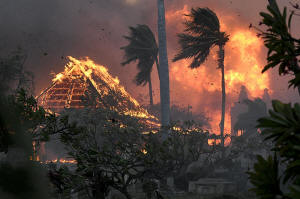|
Hawaii Attorney General Anne Lopez launched an investigation
soon after last year's wind-whipped Maui wildfires that claimed
102 lives. The Fire Safety Research Institute was selected to
provide a scientific analysis of the fire and recommendations.
The first phase of the investigation detailed communications
problems while the second phase released last month described
how a lack of planning by key agencies hindered efforts to
evacuate.
The administrative investigation into past conduct didn't reveal
any facts that warranted criminal charges, Lopez said in a
statement Thursday.
“Instead, the investigation revealed many instances of great
heroism, and I wish to particularly commend Maui’s firefighters
and police officers for their professionalism and bravery in
extremely difficult circumstances,” the statement said.
The attorney general's report noted some of the challenges
facing officials and residents were particular to Hawaii and
Maui, including narrow roads clogged with parked cars, private
dirt roads blocked by gates and older, wooden homes separated by
less than 6 feet (1.8 meters).
The attorney general's office says the third and final phase
will include a forward-looking report on the question of how to
prevent the August 2023 tragedy from happening again. It's
expected to be released early next year.
In a separate investigation, officials with the U.S. Bureau of
Alcohol, Tobacco, Firearms and Explosives and the Maui Fire
Department did not address liability but found that the wildfire
erupted from an earlier brushfire, sparked by downed power
lines, that firefighters believed they had extinguished.
Thousands of Lahaina residents have sued various parties they
believe to be at fault for the fire, including Hawaiian
Electric, Maui County and the state of Hawaii.
A few days before the one-year anniversary of the wildfires,
Hawaii Gov. Josh Green announced a $4 billion settlement. That’s
the amount the defendants have agreed to pay to settle claims.
But the deal is tied up in court. The Hawaii Supreme Court is
considering whether insurance companies can go after the
defendants separately to recoup what they’ve paid to
policyholders.
All contents © copyright 2024 Associated Press. All rights
reserved |
|




